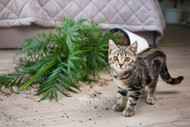Why do cats knock things over?
29th Aug 2023
This is a curious question when it comes to cats, as they are well known for their agility & precision.
However, most cat owners can imagine the scene; your cat has an almost mischievous glint in their eye as they prowl towards the new vase of flowers you put on display only moments ago. With only seconds to spare, you know you must spring into action to avoid catastrophe as your cat swipes to knock the vase off the shelf. Depending on how frequently your cat displays this behaviour, and how many breakable objects you have around your home, you may find this either annoying, amusing, or both! The bigger questions however, are why do our cats act this way? And, what can be done to limit the damage?
Predatory instinct
As true carnivores, cats have a deeply ingrained instinct to hunt and to be curious of the things around them. They bat things around to test if they are potential prey, checking to see if the items are dead or alive, or if they could be a danger or threat to them. When this happens, items can be knocked to the floor either by accident, or so that your cat can examine them more closely on ground level, or to observe the reaction of the object. Both indoor and outdoor cats will have this instinct, even if they have never been in a real-life predator/prey situation. Newly placed items in your home will attract more attention.
Attention seeking
If you react to your cat knocking something off a shelf or windowsill, you are training them that this is how they get your attention. Your reaction, be it big, small, positive, or negative will be noticed by your cat. They will remember this for the next time that they think you are paying too much attention to the television, and not enough attention to them! When they do this, it is best to just ignore them. Pick up the fallen objects later when they are not looking. Obviously, this will not always be possible, especially for wet or broken items that have become a hazard, but still do not pay any attention to your cat as you are cleaning up. Turn your back to them and ignore them completely.
Boredom
The devil makes work for idle paws, and nuisance behaviour is often caused by boredom. If your cat does not have enough toys or mental stimulation, they will make their own fun, playing the game of “what will happen if I push this thing”. To avoid this, it is not only important to provide your cat with toys, but also to rotate them so they do not get bored. Keep some toys packed away, and swap them every couple of weeks, so your cat has something new to occupy them and investigate. Supply toys that encourage their natural hunting behaviour, such as feather wands, toy mice, motorised toys, and laser pointers. Actively play with your cats for at least half an hour a day to keep their minds busy. Build a perch near a window so your cat can observe the world even in wet weather, or particularly if they are an indoor cat. Even better if there is a bird feeder for them to watch.
Avoid any major incidents by ensuring any dangerous or breakable items are locked away in a cupboard or cabinet. Houseplants should be potted in heavy pots that cannot be tipped over by a cat.
Pre-empting your cat’s behaviour can go a long way to minimising the destruction. Redirect them if you see them going towards a shelf of knickknacks! Attract their attention elsewhere before they have time to even consider knocking anything over. Once they have been distracted by the toy you have offered them, you can reward them with a treat to reinforce their good behaviour.
